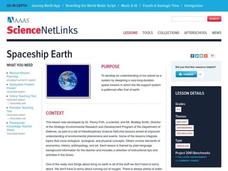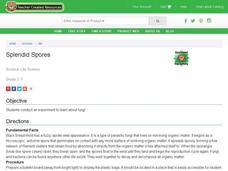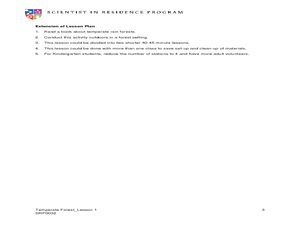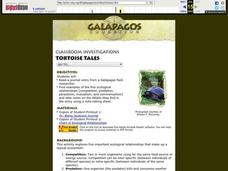Curated OER
Ruminating on the Digestive System
Students compare the digestive systems of the buffalo and of the zebra, diagram their systems, and compare their lengths. In this digestive system lesson plan, students learn about their diets as well.
EduGAINs
Consumerism, Me and the Natural Environment— Canadian and World Studies
Just as no man is an island, no country is totally independent of other countries. To understand the impact of individual consumer decisions on the global natural environment, class groups consider how the stuff they...
ARKive
Temperate Rainforest in the Pacific Northwest
Explore the amazing temperate rainforest of the Pacific Northwest. Your class starts by investigating the animals and plants of the Northwest, specifically Washington, and then research an animal population common to the area. In small...
Curated OER
Spaceship Earth
Students develop an understanding of our planet as a system by designing a very-long-duration space mission in which the life-support system is patterned after that of earth.
Curated OER
Solid Waste and Recycling
Students demonstrate effects of waste on environment and ways of reducing it, observe how much packaging goes into bag lunches each day, and survey their families to assess awareness levels and household recycling practices. Lessons all...
LABScI
Population Dynamics: The Predator-Prey Lab
Wolves eat better when the bunny population increases, but how long does that last? A series of 12 biology lessons uses the sixth installment to explore the predator-prey relationship between bunny and wolf populations. Young scientists...
Curated OER
Exploring Ecosystems
Students examine the relationships between plants, animals, and the environment in ecosystems. They sort animal cards, collect natural materials from the schoolyard, and record an ecosystem web in the form of a poster.
Curated OER
Matters of Milk and Marshmallows
Students observe a teacher demonstration o classifying matter by its physical properties of shape and size. After discussing the definition of matter, students describe the state of matter. They sing a song to the tune of "Bingo." In...
Michigan Sea Grant
Invasive Species
Learners identify invasive species to the Great Lakes and analyze their impact on the ecosystem. Using photo cards with pictures and facts, young scientists work in small groups to match invasive species with their corresponding...
Curated OER
This Can't be a Plant
Students grow mold. In this science experiment lesson, students grow mold on different pieces of bread by adjusting the moisture, temperature, and light. They record the results to see which grows the most mold.
Curated OER
Dissecting Owl Pellets
Students dissect owl pellets. In this dissecting owl pellets lesson, students discuss birds of prey and make predictions about what they may find during the investigation. Students tease out skull and bones and try to make a complete...
Curated OER
Splendid Spores
Students explore fungi. In this fungi lesson, students take a slice of bread and leave it outside for a day. Students record their observations of the fungi on the bread the following day.
Curated OER
Exploring Forest Objects
Students explore the forest. In this ecosystems lesson, students rotate through sensory activity centers, brainstorm, and read about temperate forests.
Curated OER
Funky Fomites and Aseptic Microbiology Techniques for Bacterial Isolation
High schoolers listen to a lecture on the purpose of practicing aseptic technique as well as an explanation of how to practice them. They practice aseptic technique by plating bacteria in order to isolate individual colonies of bacteria....
Curated OER
Biomass: The Energy of the Future
Sixth graders examine information about a variety of renewable fuels. They read key vocabulary terms, read and discuss a story handout, and conduct research on renewable fuels. Students then complete a comparison chart, and write an...
Curated OER
What is Coral?
Students discuss what they know about coral reefs and are introduced to the importance of preserving coral reefs. In this coral reef lesson, students make connections between coral ecology in the classroom and in the real environment...
Curated OER
Crisis in Sudan: Responding to Medical Emergencies
Students examine the crisis in Sudan. They identify the medical situation in the region and discover how they respond to emergencies. They research diseases that are prevalent in the region as well.
Curated OER
Happy Habitats
Students explore different habitats. For this habitat lesson, students investigate four different habitats through participating in a WebQuest. Students create an animal web using Kidspiration or a video documentary upon completing the...
Curated OER
Bioplastics
Learners define bioplastics and identify its uses. In this bioplastics lesson, students compare and contrast styrofoam to starch peanuts after careful examination. Learners understand what biodegradeable means.
Curated OER
Pond Ecosystem Field Trip
Students investigate the environment by participating in a class trip. In this pond ecosystem lesson, students define a list of vocabulary terms associated with ponds such as invertebrate and metamorphosis. Students attend a field trip...
Curated OER
Tortoise Tales
Pupils read journal entry from a Gal??pagos field researcher, find examples of five ecological relationships (competition, predation, parasitism, mutualism, and commensalism) and take notes on the details they find in the entry using a...
Curated OER
Plant Parts and Functions
Fifth graders examine two or three unfamiliar flowers or fruits, such as eggplant and mango and realize that each flower or fruit comes from a flowering seed plant. They then identify the plants.
Curated OER
Skeletal, Skin, and Muscular Systems
Eighth graders explain the functions of various body systems. Using a concept map, 8th graders identify and explain the fuctions of the skeletal, skin, and muscular systems of the body. After completing their concept map, students...
Curated OER
Diseases
Sixth graders create a type of notebook or journal using colored copy paper on which to take notes. They complete research on a certain disease and report on it and then design their own disease causing bacteria or virus. Finally, 6th...























